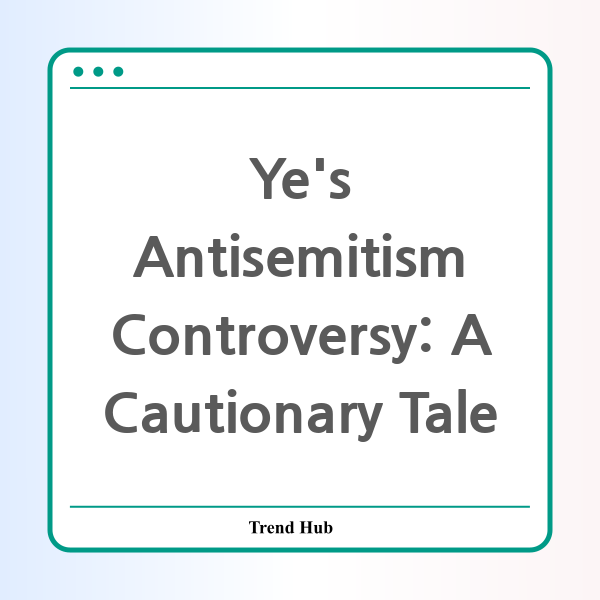* This website participates in the Amazon Affiliate Program and earns from qualifying purchases.

Is Ye’s Change of Heart Genuine, or a PR Move?
In a surprising turn of events, the rapper Ye, formerly known as Kanye West, recently declared on social media that he is "done with antisemitism." This public announcement comes on the heels of a FaceTime call with his four children, which he claims sparked a desire to "share peace and love" rather than propagate hate. But can we really take these words at face value, considering his turbulent history?
The Weight of Past Actions
Ye has faced intense scrutiny for his past antisemitic remarks, including some that were so extreme they drew comparisons to the infamous dictator Adolf Hitler. This behavior has cost him dearly, leading to severing ties with major brands like Adidas and Balenciaga, as well as being banned from digital streaming platforms. Despite previous apologies, including one directed at the Jewish community where he expressed regret and a desire for unity, his actions often contradicted his words.
A New Dawn or Old Habits?
Following his recent announcement, many are left questioning the sincerity of Ye’s newfound stance against antisemitism. Could this shift be genuine, or simply a calculated move to rebuild his tarnished image? The timing aligns with his evident struggles in the industry and the backlash he has received for years of provocative behavior. His critics are wary, pointing out the cyclical nature of his apologies and the continued distribution of his controversial art, which includes antisemitic themes.
Impact of Digital Content Moderation
The permanence of Ye's controversial work raises questions about accountability in the age of digital media. Even as platforms attempt to pull down content that promotes hate, many pieces of his music remain available online, further complicating the battle against hate speech. This reality poses a significant challenge for content moderation and speaks volumes about the responsibilities of artists and platforms alike in the fight against hate.
The Role of Personal Loss
Interestingly, it’s been suggested that Ye's downward spiral began following the death of his mother, Donda West, in 2007. Friends and colleagues who once celebrated his creativity now express sadness over his decline, citing this pivotal moment as a turning point in his life. His former collaborator, a prominent artist in his own right, elaborated on how the loss of Donda seemed to instigate a profound change in Ye's outlook and behavior. With each public misstep, many wonder whether the rapper has been grappling with deeper emotional struggles beyond the public persona.
Seeking Forgiveness in a Digital Age
Ye’s recent commentary about seeking forgiveness raises ethical questions about how we respond to celebrities who make mistakes. Should we offer them grace, or hold them accountable for their historical actions? As fans and consumers, we navigate a complicated landscape where the art we admire often reflects the values (or lack thereof) of its creator. The challenge lies in distinguishing between support for art and support for the ideologies that may accompany it.
Conclusion: A Journey Ahead
Ultimately, the question remains: can Ye redeem himself, or is he destined to be remembered for his controversial statements? Whether his call for peace will lead to tangible change remains to be seen. Time will reveal whether this is merely another chapter in a tumultuous saga or a sincere commitment to a more loving and inclusive outlook.
As Ye navigates his public apology, the world watches closely, hopeful yet skeptical of a true transformation in the face of adversity.
* This website participates in the Amazon Affiliate Program and earns from qualifying purchases.